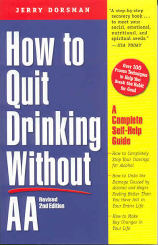Something You Learned
Alcohol is not an easy drug. It doesn’t come with instructions; you have to learn how to use it. In fact, the more you drink, the more there is to learn.
Some of this learning can be fun. When we first start drinking, we learn the many ways alcohol helps us. We think it’s great. Then we begin a long process of learning how to gain the most benefits every time we drink. But that means we also spend a lot of time learning to minimize the many problems alcohol can cause.
For instance, Mary learned early on that alcohol helped her with shyness. It helped so much she quickly began to drink in all social situations. She practiced drinking just enough to get the right buzz for every occasion. She worked on it long and hard. She had to learn how to pace herself so she wouldn’t get too drunk too soon and blow her cool.
Learning not to over-drink, to get the perfect glow every time, is difficult. You have to learn your limits. If you drink too much too fast, you might become sick or cause an embarrassing scene. You might get in a bad mood or just get downright sloppy. You might get in trouble with the law. Or you might lose control and hurt someone you really care about.
How can you control your drinking all the time? It’s hard. In fact, it’s damned near impossible. There are just too many variables. For instance, whether you get drunk and how fast you get drunk, depends on:
- how much you’ve eaten, what you’ve eaten, and when
- what your mood was before you started drinking
- how long since your previous drink
- how long since your previous drunk
- how many other toxins your liver is struggling with (such as food preservatives and chemical additives, environmental toxins from the air or water, any drugs you have taken including prescription drugs, how much sugar you’ve consumed and so on)
- how you’re consuming your alcohol (how fast, what strength, from what source—beer, wine, or liquor, and even what type of beer, wine, or liquor)
- other variables such as time of month (for women especially but men also have monthly biological cycles), outside stress factors in your life, whether your body is fighting an illness (even something as simple as a sore throat)
That’s a lot to learn. But as alcoholic drinkers, we attempt to learn it all. Our purpose? To gain control over alcohol—so we can get as high as we want, without overdoing it. Some of us become so adept that we can control these variables most of the time.
But when you get this good, surprisingly, there’s not much excitement anymore. When you’re this good at drinking, you normally follow the same routine every day. You maintain a steady alcoholic equilibrium and after awhile it gets very boring. Most alcoholic drinkers lose control of their alcohol intake. Not all the time, but often. In some ways it’s more exciting to lose control once in awhile, but it’s also dangerous. When we get too drunk, accidents can happen. Serious accidents. So we try to control the uncontrollable and minimize the danger of hurting ourselves and others. As we drink we think, “I can control it if I try.” And we keep trying. And trying…


